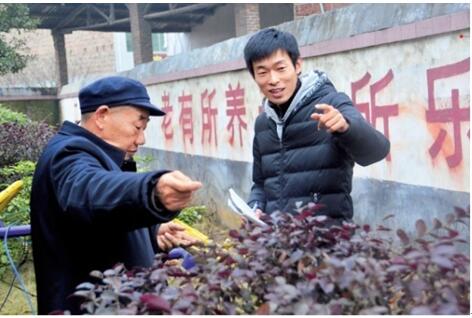Yale graduate serves countryside
 0 Comment(s)
0 Comment(s) Print
Print E-mail China.org.cn, April 28, 2016
E-mail China.org.cn, April 28, 2016
Five years ago, when Qin Yuefei graduated from the prestigious Yale University, he could have found a well-paid job in big cities like New York or Beijing, and lived an affluent life thereafter. However, to everyone’s surprise, he journeyed to the hinterlands of China and became a grassroots village official earning only 1,450 yuan (US$224.46) a month.
 |
|
Qin Yuefei (R) talks with the head of a local nursing home in Hengyang City, Hunan Province on January 15, 2013. |
Two years ago, when Qin’s office term ended, he got the chance of being promoted to a higher-rank government post. But to everyone’s surprise again, he volunteered to work in another village some 30 km away from the previous one with his salary totally unchanged.
Even to this day, Qin’s career choices have confused many people.
Born in 1985, Qin was a city boy with little experience of villages or farmers. His parents are both salary workers in Chongqing, a major city in southwest China. Since Qin’s childhood, he has been known as a gifted boy with great talents in leadership and innovation. When he graduated from high school, he got full marks on his TOEFL exam, a widely used English-language exam, and obtained a full scholarship at Yale. That year, Yale only took in two high school graduates from China.
During his four years at Yale, Qin studied both political science and economics. When he graduated in 2011, he returned home and took the exam held by the local governments in central China’s Hunan Province to recruit grassroots village officials. After rounds of exams and interviews, he became an assistant to the director of the village committee in Hejiashan Village.
As a village official and a member of the Communist Party of China, Qin’s work covered different aspects of the daily lives of his villagers -- agriculture, economy, education, healthcare and public infrastructure. Thanks to his efforts, an aging water conservation project was repaired and upgraded. It ensured that farmers could reap a good harvest even during droughts. Qin also raised funds with charity organizations for children and the elderly. With the money, he managed to expand the nursing home in the village and buy 700 tablet computers for students of four primary and middle schools near Hejiashan. With interactive educational software, students receive remote guidance from volunteer teachers via the internet.
However, when Qin reviewed his work at the end of his office term, he found that he was only able to tackle specific problems, but failed to promote sustainable development in the village. The village could easily return to its previous state after he left. Therefore, he decided to work in another village and tried everything he could to make real changes in the countryside.
In Baiyun Village, Qin established a cooperative to help farmers sell their products on an online platform. The website, known as Serve for China, has attracted many graduates of famous foreign colleges and village officials with a background of college education. By integrating top resources in the internet, agriculture, finance, media and academic fields, the platform is aimed at helping village officials better serve China’ s countryside and encourage comprehensive change.
“It’s true that many of my classmates chose high paying jobs, but we are all serving society. The only difference is that we are serving society from different perspectives and in different sectors,” Qin said.
Being a village official, Qin is able to see how people live at the bottom level of society. “This broadens my view and offers me opportunities to solve practical problems. Every day is new to me, so my choice has been worth it,” he said.






Go to Forum >>0 Comment(s)